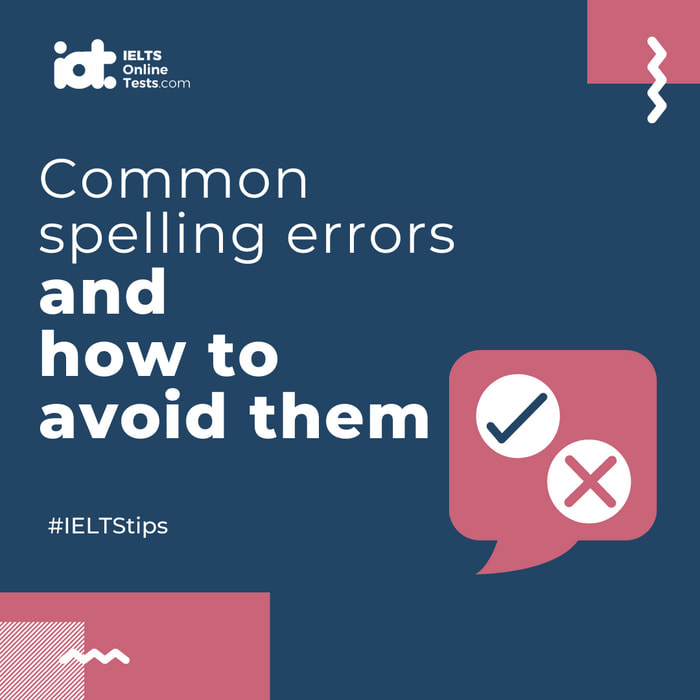
Common Spelling Errors and How to Avoid Them
Many students often make mistakes in writing some words incorrectly as they are ambiguous about their spellings. Committing spelling errors can cost you in IELTS exam as it increases the number of errors in your writing tasks.
Some students struggle a lot with spelling errors and just can’t get rid of them. Some of the mistakes include, for example, missing the alphabet ‘a’, ‘e’, ‘i’ in the words or writing single letter in the words where double letters are to be written and vice versa.
Let us find out what kinds of spelling errors students generally make so that you can learn from those mistakes and avoid committing them completely:
Common Spelling Errors
1. Single/Double Letters
Sometimes, you may be getting confused in some words as to whether you should put a single letter or double letters in those words. For example,
Embarasment – Incorrect
Embarrassment – Correct
2. Silent Letters
In English, one or the other letter may be silent in a particular word when you say it but in writing, you cannot ignore that letter. For example,
Hankerchief -Incorrect
Handkerchief – Correct
3. Position of ‘i’ and ‘e’
There are many words you may come across on a daily basis that include putting the letters ‘i’ and ‘e’ together. In some words, you use ‘i’ followed by ‘e’ while in others, it is just the reverse. For example,
Recieve – Incorrect
Receive – Correct
4. Confusion with ‘or’ and ‘er’
You find some words that end with ‘or’ e.g. doctor, while you use ‘er’ in some words e.g. gather. You are likely to get confused in this case and hence, you need to be careful about these words. For example,
Travellor – Incorrect
Traveller – Correct
5. Writing How you Speak
Being a non-native speaker, you often borrow some words from your local language or speak some words incorrectly with your local accent and thus try to write English words in the same way. For example
Modren – Incorrect
Modern – Correct
6. Words that Sound Similar
Many words in English language sound very similar to each other but are drastically different in meaning. So, you are likely to make mistakes while writing such words. For example,
Accept/Except
- Accept – Kindly accept my apology.
- Except – I work every day except Sunday.
Their/There/They’re
- Their friends are really good people.
- There are many friends of mine.
- They’re my friends and I love them.
How to Avoid Spelling Errors
Surely, there are ways to avoid spelling mistakes and if you work on them, you can definitely write them correctly.
- People who write free from spelling errors read and write a lot. So, you can also make the habit of reading articles in magazines, newspapers or on the websites.
- Practice writing those words where you usually make mistakes again and again as this will help you to learn them well. Once you absorb the right spelling of a particular word, you would never make mistake in writing its spelling incorrectly.
- Play spelling games online that would help you remember the words in a fun learning environment.
- One basic tip is that once you make any spelling error, remember the correct spelling of that word confidently and then try best to avoid making the same mistake again and again.
Exercise:
Write correct spelling of the following words which are incorrectly written:
- Multidisiplinery
- Modren
- Etiquite
- Carreer
- Favouraite
- Whealthy
- Attractes
- Northen
- Tutourial
- Buisness
- Ciggar
- Fullfillment
- Accomodation
- Avaliable
- Begining
- Intrest
- Affectivily
- Aera
- Requried
- Beleive
- Seperate
- Furthremore
- Repitition
- Immidiately
- Acknowlegment
- Foriegner
- Fourword
- Confidantly
- Faithfuly
- Sincerly
Answer:
- Multidisciplinary
- Modern
- Etiquette
- Career
- Favourite/Favorite
- Wealthy
- Attracts
- Northern
- Tutorial
- Business
- Cigar
- Fulfilment/Fulfillment
- Accommodation
- Available
- Beginning
- Interest
- Affectively
- Area
- Required
- Believe
- Separate
- Furthermore
- Repetition
- Immediately
- Acknowledgment/ Acknowledgement
- Foreigner
- Forward
- Confidently
- Faithfully
- Sincerely




